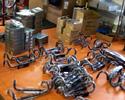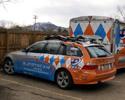
Recently on Cyclingnews.com |
An interview with Jonathan Vaughters, January 29, 2008
Captaining the Slipstream ship
On paper, the new Slipstream-Chipotle team has the potential to do great things in 2008 and beyond. But up until now, it has been all theoretical and speculation. Cyclingnews' Mark Zalewski has followed the process of the team coming on line, speaking with team director Jonathan Vaughters at both of the team's training camps in Boulder, Colorado and Silver City, New Mexico. Over this time the team earned an invitation to the Giro d'Italia, won medals at the Los Angeles Track World Cup and placed second in the opening team time trial of the Tour of Qatar.
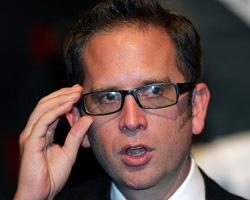
|
If Jonathan Vaughters ever gets tired of this whole 'cycling' thing, he could probably find a job as a sea captain, since he has become well-versed in navigating uncharted and potentially rocky waters – building an entire team from the ground-up, and moving it from a small developmental team to become, at least on paper, a contender for just about any race in the world. Of course Vaughters does not take sole credit for this work. Actually, he only credits himself with one thing, picking the right people for the various jobs.
"I do have a crack staff, that is for sure!" he said. "They are smart and don't necessarily come from a cycling background, they are just hyper-perfectionist people from a business background. My biggest part is that I'm really good at picking people. At the end of the day I can only do so much – I bring a leadership and emotional component to things. I'm not an organized person myself, but I have good vision and pick people who are organized. That is the most bragging you will ever get out of me!"
Think different
If a theme of the 2008 Slipstream-Chipotle team could be extracted, it would be this: everything about it is different, from the organization, to the logistics, to the personnel, to even the mood of the riders – which is one of the best indicators that the differences are working. All of this begins and ends with the team support staff, and how they are working is also different.
"It was nice to finally be in a position where I don't have to ask for it, I can demand it."- Slipstream's high-profile signings gave Vaughters instant bargaining power with equipment sponsors. |
"From a staff perspective, their year would end usually after the bike shows, take a break and then slowly ramp up at the beginning of the year," said Vaughters regarding previous years. "But I said let's just work through it. With the pace of the build-up that we are doing and the learning curve we can't afford it.
"Let's go hard until this camp, learn from this camp and then actually have enough time to adjust for next year. We can use this time between to make adjustments to things like bike designs. If you do a wind tunnel test at the camp in January you don't have time to change the bike or clothing orders."
From Boulder to Silver CityJonathan Vaughters discusses things learned between the two training camps, as well as his reactions to the Giro invitation.Looking back on the past few months, Jonathan Vaughters is satisfied with the team's progression, both from a logistical and on-the-road perspective. On the logistics, he said the learning curve has been a steep one.
"We have been scrambling for sure, the learning curve is steep," he said. "But I chose younger people to run the team so of course they don't have 40 years of experience – but in the long term we are breeding loyalty by giving them ownership in the project. Everything has turned out well, but we've had to work harder to get there. "I think my ulcer has grown a little, but honestly we haven't had anything go really wrong. We've put out all the fires before they became fires." On the invitation to the Giro d'Italia, Vaughters said it is a double-edged sword. "I'm actually surprised that RCS had that much faith before we actually raced. I'm confident we'll have a strong kick-off, but it's great to see that they decided on us 'sight unseen'. In some ways it puts more pressure on us to perform well.
While the team has not had the chance to prove itself on the road yet this year, it has put up some good results on the hardwood. Young Taylor Phinney in the individual pursuit at the LA World Cup, while Mike Friedman put on a strong performance with Colby Pearce in the Madison. "I think the track is good, we are in an Olympic year and our effort will pay off with a couple of Olympians." The track has been a nice secondary training avenue for the team, said Vaughters, who pushed the riders to do the team pursuit two years ago. While it did not result in medals, the effects of it did filter down. "We tried team pursuit and that didn't work, but all that knowledge Allen learned from it he put into Taylor. With Taylor all we did was put together the technological aspect and Allen readjusted his training. "I think Danny Pate was changed as a rider by doing the team pursuit. He always pushed too big of a gear and wasn't an efficient rider. And it changed his time trialing for the better." But it is all primarily about the road. While Mike Friedman has been riding successfully on the track, possibly in line for an Olympic spot this year, once the Games are over he would like to have him put the track on the back burner for more road aspirations. "In 2009, I'd like to see someone like Friedman focus more on the Classics." |
The expanded time line does allow for the team to make significant changes, including to its equipment. However, that always depends on what the equipment providers can handle, and before, as a smaller team, Vaughters had to defer to sponsor production schedules and abilities. But now, with this team of riders, sponsors were willing to bend over backwards, giving him the unique ability to dictate terms.
"It puts a lot of pressure on our vendors, but overall we are the hot property right now," he said. "When I had sponsorship talks at the [Interbike] show, I was extremely demanding on how I wanted it and when. Those who stood up and said they could deliver we signed, and those who wavered we said 'no way'. It was nice to finally be in a position where I don't have to ask for it, I can demand it."
Vaughters summed up the rationale for pushing the support staff and vendors to such limits. "You can't control the talent of your riders but you can control the logistics, so why not make it the best in the world?"
Lead by example
Beginning in 2007, the Slipstream team took the doping issues plaguing cycling by the horns and faced it head-on – instituting a voluntary and independent testing program with the Agency for Cycling Ethics (ACE) consisting of frequent drug tests as well as blood leveling, creating a biological record for each rider. The lengths to which the team is going to insure its riders are drug-free has resulted in a lot of positive press as well as reactions from race organizers and the UCI. With the stated goal of gaining a wild card entry into the Tour de France this year, the combination of a clean and star-studded team could make that goal a reality.
"I think the talks are going as well as they can," he said regarding the Tour. "Next year is like a blank slate for the big races – no one has a guaranteed entry now and we are going in a really good position. We are focused on our game. All of the other stuff going I can't do anything about. I read it in the news and I hope they don't continue to explode."
An indication of just how far Vaughters is taking the anti-doping measure and UCI relations was with one of the many guest speakers for the team camp – Anne Gripper, the UCI's anti-doping manager.
"Anne Gripper's talk was really interesting for all of us," said Vaughters. "The riders actually interacted with her! They got out of the 'UCI is the enemy' mentality and realized that we are all in this together. 'We can actually give you suggestions that you will actually use? Wow! That is cool.'"
"Tom Danielson said it seems so basic but one of the things you can do in the fight against doping is make sure all of the team doctors are qualified. I've never even asked the UCI what the requirement is to be a team doctor. I was on a team... I won't say which, where the team doctor was a psychiatrist! And Anne said that it was a really good idea and was going to bring it back to the UCI and suggest it. All of a sudden it was like a cooperative!"
Defining Slipstream
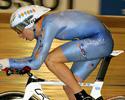
|
With such an extreme overhaul of the riders from 2007 to 2008, as well as stepping to a new level of competition, determining the defining aspects of the team, both to itself and to the peloton, is important for Vaughters.
"The biggest thing I wanted to see out of this first camp was bonding, because from here on out it is all business," said Vaughters. "We do have two groups of riders – guys who have been here for three or four years and guys who I have brought in – it is almost 50/50."
The success of this integration would be tested at the team's second camp in Silver City – where the real training would begin. "The first couple of days it was old guys and new guys with the training," said Vaughters. "Our old team has always been pretty relaxed and when they saw how serious Christian and Zabriskie were it was a wake-up!
"But now it has continued with the bonding process we had in November. We've been going up climbs and the general fitness level of the team is impressive, really. I'm impressed with the younger guys stepping up to the level of the veterans."
When pressed to pick-out anyone that is really standing out, Vaughters turned shy, not wanting to show his cards for the upcoming races such as Qatar and California. "I don't see anyone struggling at all, so it's hard to see anyone standing out."
The team also has an increased influx of non-American riders, though most are fluent in English. Still, the foreign aspect is a key for the new team. "It is an American team with a majority of American riders and mostly English speaking, so I think it is important. But we are a cosmopolitan team. If you look at the spirit of the team, it is American... but America at its best. Not the ugly American!"
Cosmopolitan? That sounds a little GQ Jonathan... "That's it, the metro-sexual American team!" exclaimed Vaughters, a self-proclaimed metro-sexual male. "That is literally the spirit of the team. We are proud of things like the Bill of Rights over here, but we have people that can speak a bunch of different languages too!"
"The reason why I raced the living crap out of the guys last year is so that they could handle racing with the new guys this year."- Vaughters had a vision for Slipstream before its increase in size and stature. |
As for defining the team's place among the other teams, particularly in the European peloton, Vaughters hopes that having so many veterans will help the team establish itself as a contender – and not just as the 'anti-doping team.'
"I think at first it will be, 'Huh, new team?' But that is why we have so many established riders which will bring along our other riders and establish them. I'm not worried about it, or that we have taken a strong stance on the issues. If they want to do it there way, fine. If they want to try our way, I'll give them ACE's card.
"We don't think we are superior to anyone," he said. "And I think just being up there in the mix, showing our colours, will show that."
But still, he also hopes that his team's example of racing clean will filter across the sport and is glad to see that other teams are stepping up. "I really want to give Johan [Bruyneel] props for taking on the Damsgaard program for Astana. Every team deserves a second chance."
Not (just) the anti-doping team
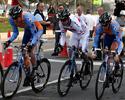
|
One side-effect of being so publicly against doping is the idea that it will become the central identifier for the team, something that Vaughters does not want to have happen. In terms of pursuing invites to the Grand Tours and other major races, he wants the team to be judged on the merit of its roster and accomplishments. However, having none entering the season, the anti-doping theme does seem to help open the doors.
"That is all well and good, but that still puts pressure on us more to actually race," he said. "But I am very confident that we are going to do well, we will punch above our weight!
"Yes, we focus on anti-doping, but at the same point in time, we are a racing team first. The reason why I raced the living crap out of the guys last year is so that they could handle racing with the new guys this year. I'd really like to see all doping stories to fade away. The best headline we've seen so far is Taylor Phinney winning the Track World Cup."
Now that the season is starting, Vaughters sums up the team's changing mentality: "We are taking off the goodie two shoes and putting on the racing shoes!"

